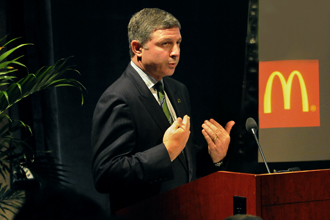McDonald"s: We"re "Lovin" It" Again
In the latter half of the 20th century, McDonald's became a juggernaut and a global symbol of the ubiquity of American culture. In the 1990s, however, a rise in health-consciousness and concerns over food quality caused a crisis of brand confidence. But savvy marketing can rehabilitate any brand, says Neil Golden, McDonald's chief marketing officer.

McDonald's has a strong commitment to quality, says Neil Golden, the company's chief marketing officer, who spoke on Monday (April 4) at the Freeman School of Business. (Photo by Cheryl Gerber)
Delivering the 2011 R. W. Freeman Distinguished Lecture recently on the Tulane uptown campus, Golden told of McDonald's struggles and how they resulted in decreasing profits that culminated in 2003 with the company posting its first quarterly loss since 1965.
Since 2003, by launching a marketing campaign encompassing the introduction of salads, a renewed insistence on quality and that devastatingly catchy “I'm lovin' it” jingle, McDonald's has succeeded in adding an aggregate $13 billion to its business, said Golden. By espousing a spirit of fun and family, and by diluting the concern over unhealthy menu options with the addition of healthier ones, McDonald's managed to quell customer concerns and reestablish itself as a nationally loved brand.
For Golden, the key point of contention in McDonald's quest for rehabilitation was the friction between the facts as the company sees them and the facts as they are popularly perceived.
“The reality is that it's outstanding food,” he assured students and faculty of the A. B. Freeman School of Business. “The commitment we have to quality within the organization is arguably better than any other food service establishment in the world.”
In a world where facts flow from agenda-driven sources, perception has become a marketable stand-in for reality. Given the bounce-back results Golden cited, we are lovin' it once more.
Cody Wild is a first-year student studying English and political economy.
